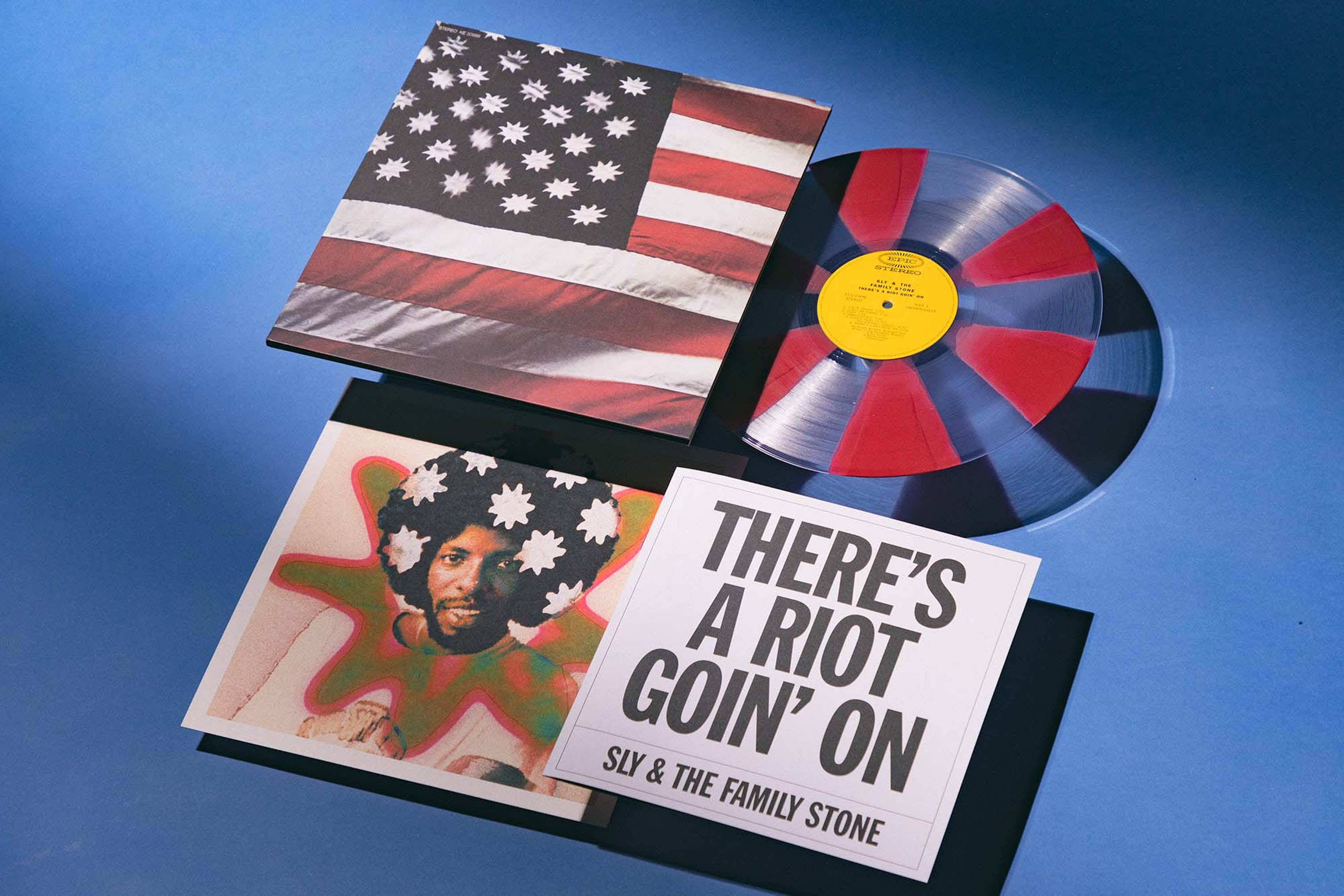Sly & The Family Stone’s ‘There’s A Riot Goin’ On’ Receives Essential All-Analog VMP Reissue
Sly’s dark and cryptic opus gets the reissue it deserves
Many classic albums are lauded as “singular” and “groundbreaking,” but after a while don’t really sound like it, because everyone afterwards did it, or we realize that someone lesser-known did it six months earlier. Yet 52 years later, Sly & The Family Stone’s There’s A Riot Goin’ On remains as singular and confounding as ever; nothing remotely like it existed before, and nothing since has done exactly what it does. Time strips the mystery of things: for example, every new generation loves the Beatles and acknowledges their objective historical importance, yet Sgt. Pepper doesn’t sound so world-shifting anymore because everyone took so much from it. There’s A Riot Goin’ On remains impenetrable and unique, because while its elements have scattered throughout popular and underground music since, it operates in a manner that’s impossible to plagiarize. People can emulate the Beatles’ musical feel easily enough that “Beatlesque” is an accepted adjective with a Wikipedia page. Sly Stone’s early 1970s work isn’t like that, because exactly what makes it work is much harder to pinpoint.
1969 found Sly & The Family Stone at the height of their fame, their album Stand! preceding a Woodstock appearance and a slot at the Harlem Cultural Festival. Their music was uplifting, optimistic about solving the problems that plague society, and their live performances were absolutely electrifying. Listen to the Live At The Fillmore East double LP recorded in October 1968 and finally released in 2015. Sly Stone’s performance is infectiously charismatic and the whole band is on fire. Their songs had lyrics like “Don’t hate the Black/Don’t hate the white/If you get bitten, just hate the bite/Make sure your heart is beating right.” The music was determined to drive positive change, but not in an overly confrontational way.
As the dream of the 60s slipped away, Sly Stone crashed, strung out on cocaine and PCP and holed up in his Bel Air mansion, often missing his own shows. 1970 passed with no new album, so an anxious Epic Records shoved out the Greatest Hits compilation. Stone finally reemerged in November 1971 with There’s A Riot Goin’ On, perhaps the final nail in the coffin for the previous decade’s “peace and love” outlook. No shift in popular music is as drastic: the dark and cryptic Riot is the polar opposite of the band’s 60s catalog. In fact, most of the band is hardly on here, as Sly fought with them, became increasingly paranoid, and was advised by the Black Panther Party to fire his white bandmates, drummer Greg Errico and saxophone player Jerry Martini. (Errico left in early 1971.) “I wouldn’t trade my group for all the tea in Mexico,” Sly wrote on the back cover of 1968’s Dance To The Music, but here he traded them for outside players, himself, or his new Maestro Rhythm King MRK-2 drum machine. He recorded Riot at The Record Plant in Sausalito, California and at his home studio, often with a wireless microphone so he could record his vocals in bed.
Riot—for its time and even now—is unconventional in almost every way. It’s not particularly catchy. It’s not a glossy hi-fi production, instead sounding like a lo-fi demo because Sly constantly re-recorded over the multitracks. The songs are hardly “songs,” rather extended grooves over which Sly sings, moans, shouts, and whines. Even for this era, when music evolved and rewrote itself every few months, Riot sounds more uncommercial than any other major experimental album classified as “uncommercial.” If it wasn’t made by Sly Stone at his peak, if it was released on some local private press label instead of Epic Records, Riot would be labeled “outsider music.”
But that’s what makes There’s A Riot Goin’ On so enduring. The lack of structure, the primitive drum machine, and the hollow atmosphere so starkly contrasts any expectation. Context helps Riot even more, hearing how Sly’s shouts went from energetic—joyous, even—to anxious within two years. The America portrayed on the record is grim enough when Sly hardly sings, but even more confrontational on the few occasions he writes coherent lyrics. Opener “Luv n’ Haight” references Sly’s state at the time with the line, “Feel so good, inside myself, don’t wanna move.” “Family Affair,” the album’s lead single, portrays “One child grows up to be somebody that just loves to learn/And another child grows up to be somebody you’d just love to burn.” The Black Panther Party asked Sly to make “militant” music: as he says on “Poet,” “My only weapon is my pen/And in the frame of mind I’m in/I’m a songwriter, a poet.” Side two isn’t as strong as the first half, but it concludes with “Thank You For Talkin’ To Me Africa,” an extended vamp on the December 1969 single “Thank You (Falettinme Be Mice Elf Agin).” It speaks to fears of violence while referencing earlier songs and concludes, “Dyin’ young is hard to take, sellin’ out is harder.” It’s the album’s only slight hint of resolution.
Musically, Riot is deep, subtle funk that’s overt in its presentation but reserved in its effect. The arrangements are fuller and more complex than they initially appear, and the drum machine serves as an interesting, consistent frame in the background (this is the first big album that extensively used a drum machine). In the time between Stand! and There’s A Riot Goin’ On, Sly ran Stone Flower Productions, a label distributed by Atlantic where he first tested many of the latter’s sonic ideas. Light In The Attic’s I’m Just Like You compilation collects this material and related demos. The album version of “Just Like A Baby” is slower and more lethargic than the earlier demo, while “Thank You For Talkin’ To Me Africa” is the other way around. You can hear how the ghostly instrumental demos “Spirit” and “Scared” respectively made way for “Family Affair” and “Africa Talks To You ‘The Asphalt Jungle’,” or how Little Sister’s excellent “Somebody’s Watching You” served as a blueprint for “Runnin’ Away.” After Riot, Sly released 1973’s worthwhile Fresh though continued to descend into a drug addiction that either he never recovered from or didn’t until it was too late.
For July’s Essentials Record of the Month, subscription service Vinyl Me, Please reissued There’s A Riot Goin’ On, cut “from tapes” by Ryan Smith at Sterling Sound. Sony hardly lets their primary (first-generation or otherwise) master tapes out of their vault, so VMP either got an analog copy of the master or somehow struck a deal to get the currently available master that may or may not be the original master tape. Whatever the case, Smith has done an excellent job and it’s probably the best we’ll get at this point, especially since it’s always been a midrange-empty record that’s very closed in on top. The last all-analog reissue was an ORG Music 45rpm edition cut by Bernie Grundman and Chris Bellman, which goes for high prices now. I haven’t heard that, but I’ve heard the SACD that ORG released around the same time (no mastering credits but it’s reasonable to assume it’s the Grundman/Bellman master). Some could argue that that one sounds “richer” but I hear it as extra midbass that thickens the presentation. The little high-frequency information on the tape isn’t there as much and of course it has the usual DSD “glaze” that I don’t like. Smith’s cut for VMP, whatever tape it’s from, has quieter backgrounds, more air, and greater contrast than both the ORG Music SACD and Sony’s 176.4kHz/24bit stream/download. Tonally it’s similar to the Sony stream but of course the record sounds more “real.” I’ve seen some observe that this reissue smooths out the sudden dynamic bursts, and while that’s true, I don’t have a problem with it.
GZ pressed the VMP reissue on 180g “Luv n’ Haight” red and clear pinwheel vinyl, which is adequately flat and with only the slightest surface clicks. The tip-on gatefold jacket feels great to hold but the artwork scans aren’t great, and the light blue box from the original Epic LP is still in the top right corner (some reissues have it, others don’t). It also doesn’t include the original’s lyrics sheet. Some of VMP’s “Listening Notes” booklets are really good while others are borderline unreadable; Shannon Ali’s essay here doesn’t stand out one way or another. The package also includes an art print of Sly Stone by Jean Pierre Consuegra, which is also fine but I personally don’t care about the extras if the core record and jacket are good. Artwork issues aside, this is the excellent reissue that this album deserves, and surely far better than the other currently available options (digitally-sourced editions cut at Nashville Record Productions and in-house at Takt Direct, which cost half as much but are probably only half as good).





































